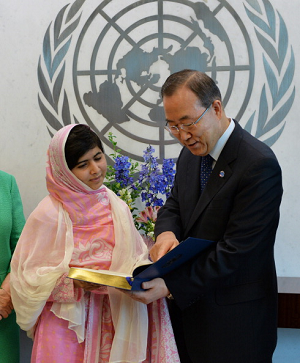Jan 07, 2026
Jan 07, 2026
 Malala Yousafzai is a 16 year-old Pashtun girl who was shot by the Taliban because she insisted on getting educated. With hospital care in Britain she miraculously survived. Last week in recognition of her courage she addressed the UN world youth assembly in New York. I heard her televised speech. It was an outstanding performance. I was heartened by her central message that free compulsory education should be given to every child in the world. Readers might recall that this writer has repeatedly advocated free compulsory primary education as the genuine affirmative action to lift the poor masses instead of the spurious caste-based reservation that helps only India’s politicians to consolidate their vote banks.
Malala Yousafzai is a 16 year-old Pashtun girl who was shot by the Taliban because she insisted on getting educated. With hospital care in Britain she miraculously survived. Last week in recognition of her courage she addressed the UN world youth assembly in New York. I heard her televised speech. It was an outstanding performance. I was heartened by her central message that free compulsory education should be given to every child in the world. Readers might recall that this writer has repeatedly advocated free compulsory primary education as the genuine affirmative action to lift the poor masses instead of the spurious caste-based reservation that helps only India’s politicians to consolidate their vote banks.
Born and brought up in Pakistan Malala does not belong to only Pakistan. She belongs to the whole world. She speaks for children all over the world. In her teens, she is already a veteran campaigner for child rights. In 2009 aged 12 she posted a blog for the BBC describing her life under Taliban rule and her commitment to education against all odds. Subsequently the New York Times made a film documentary of her life. She gave interviews to various media outlets. She appeared on the cover of Time magazine. She became Chairperson of the District Child Assembly in Swat. She was nominated for the International Children’s Peace Prize by Reverend Desmond Tutu. Now at 16 she is the youngest nominee ever for the next Nobel Peace Prize.
People of my generation in India, Pakistan and elsewhere in the world will require great effort to empathize with Malala’s world. Our mindsets are not tuned to the environment in which she grew up. We cannot think beyond our families, our cities and our nations. But Malala’s generation has access to information denied to us. For interaction it has a global reach we could not dream of. For Malala’s generation one global family of humankind is a distinct reality and not a mere utopian cliché as it was for us.
Technology is shrinking the world into a global village. For the generation with our mindsets technology is as much a threat as an opportunity. Technology has given us the power to destroy global civilization. Technology has created a world that is like a two year old child holding a loaded revolver. The world can self-destruct. Human civilizations have been destroyed before to re-emerge. It can happen again. The best that our present generation can bequeath to Malala’s generation is a world that is still intact. Its future growth will be better addressed by Malala’s own generation.
Technology has created opportunities that prevailing mindsets fail to exploit. One example comes to mind.
Recently BJP leader Mr. Gopinath Munde exposed India’ worst kept secret by disclosing the huge gap between what legislators spend in elections compared to what they declare. The oodles of black money that fund elections are a major cause of the nation’s burgeoning corruption. Demands have been voiced to introduce state funding of elections to address the issue. But what kind of state funding do critics have in mind?
With innovative use of technology electronically driven elections, with giant screens and video conferencing facilities in each polling booth area could render mass meetings and door to door campaigning redundant. It could end money power and muscle power that dominate polls today. This may sound farfetched today. It might become the norm in Malala’s world.
The disclosures of how governments of America, China and India snoop on citizens have rocked the world. But does not the threat of terrorism impel governments to keep a watch on all citizens? Because such powers can be misused obviously these should rest only with the United Nations that could perform the task worldwide. But there is another aspect of this development that has not attracted attention.
If we look ahead that day may not be far when technology might impart the power to snoop within the reach of ordinary citizens too.
How then will we deal with the situation?
The answer is that technology is not only changing the lives of people. Technology will change people themselves. It might render total transparency that will destroy all secrecy. People will have to live in the knowledge that every action and every moment of their lives may be watched by others. The new man will have to be a totally transparent man. Conceivably future summit talks between world leaders could be televised live offering the whole world opportunity to witness the proceedings. The world would then have access to universal truth. It could evolve into the Hindu legendary era of Satyayug.
Is this too farfetched? Perhaps it is. Our generation cannot predict how Malala’s world will evolve. That will depend upon the innumerable youths similar to Malala scattered across the globe. They will decide how to reform the world and its civilization. Even our half-step in the right direction will help. Our responsibility is to ensure that they do inherit an intact world and civilization which they will have opportunity to reform.
Image (c) Gettyimages.com
17-Jul-2013
More by : Dr. Rajinder Puri